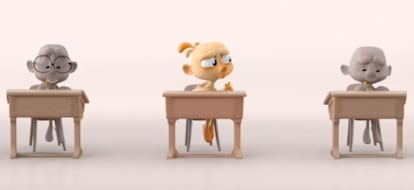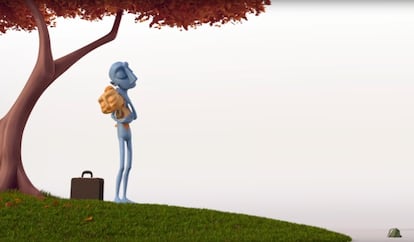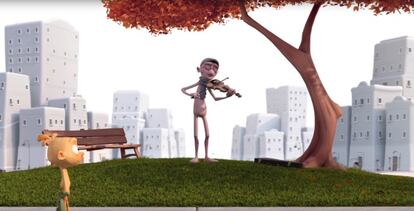The runaway success of a Spanish short on how parents stifle creativity
The eight-minute production ‘Alike’ won a Goya Award for best animated short film in 2016
It was only when he became a father that director Daniel Martínez Lara started to think about what kind of education might be best for the very young. The result was a short animated film called Alike, co-directed by Rafa Cano Méndez.
In the space of eight minutes, Alike captures the nuances of the relationship between a father and son as they work their way through the routines and obstacles of daily life.

Martínez and Cano cut costs for their self-financed project by using a free animation program. And in a gesture of reciprocal generosity, they have posted the entire short on platforms such as Vimeo and YouTube, a move that has brought them more than five million views.
“Education for children under seven is excessively focused on the curriculum – reading, writing and English,” the director tells Verne. “These things are very important but perhaps at this age they should be learning to be creative and to work in groups and other skills that are more appropriate than knowing how to count in English.”
Martínez insists that Alike is “a reflection” and does not aim “to indoctrinate”; and it is not only the education system that is in the spotlight, but also relationships within the family.

“When you become a father, you wonder if you should dare to step outside the rules imposed by society,” says the director. “The really important thing for your child is to know that there is somebody in the adult world who understands them.”
Martínez’s co-director, Rafa Cano Méndez, has provided input based on his experience as a son, as he is not a father. “Society concentrates on what it believes to be best for children, and its intentions may be admirable but they are often mistaken,” says Cano. “The pace of daily life is such that we don’t have time to consider if the most practical option is what will actually make us happy.”
Martínez and Cano started on the project in 2010 with a budget of more than €60,000. They used their own technology and savings and were supported by producer Nico Matji. But it was the 3-D Blender animation program, regularly updated by a team of techies for free, that really made their vision viable. “It was a relief financially speaking,” say Martínez and Cano. “And although it is free, it is just as effective as one you have to pay for.”

The directors add that they are not looking for a return on their investment, since shorts rarely make money. “We want it to reach people,” says Martínez. “And it has. We believe it has gone viral because it tackles areas that, post-crisis, everybody is starting to question, such as work, education and health.”
Alike’s two characters have been deliberately portrayed as asexual and of no particular nationality, while the action takes place in an non-specific city, making the film universal. In 2015, when the project was finished, it was picked up by film festivals around the world and shown on condition that the complete version must not be available online.
This exposure led to a Goya Award in 2016 for best animated short film, though the number of people who had actually seen it was tiny. “At that time we were congratulated for winning an award,” says Cano. “Now that people have been able to access the film, we are congratulated on its content.”
Both directors knew that internet could give them much greater exposure than TV, so they skipped the small screen and went directly to their favorite medium.
Now, Alike has found an audience in schools – the Ministry of Education has added it to its database so that teachers can access it and show it to their students. “Putting the film online was a way of prolonging the feeling of community that we ourselves found on the internet,” says Martínez.
English version by Heather Galloway.
Tu suscripción se está usando en otro dispositivo
¿Quieres añadir otro usuario a tu suscripción?
Si continúas leyendo en este dispositivo, no se podrá leer en el otro.
FlechaTu suscripción se está usando en otro dispositivo y solo puedes acceder a EL PAÍS desde un dispositivo a la vez.
Si quieres compartir tu cuenta, cambia tu suscripción a la modalidad Premium, así podrás añadir otro usuario. Cada uno accederá con su propia cuenta de email, lo que os permitirá personalizar vuestra experiencia en EL PAÍS.
¿Tienes una suscripción de empresa? Accede aquí para contratar más cuentas.
En el caso de no saber quién está usando tu cuenta, te recomendamos cambiar tu contraseña aquí.
Si decides continuar compartiendo tu cuenta, este mensaje se mostrará en tu dispositivo y en el de la otra persona que está usando tu cuenta de forma indefinida, afectando a tu experiencia de lectura. Puedes consultar aquí los términos y condiciones de la suscripción digital.









































